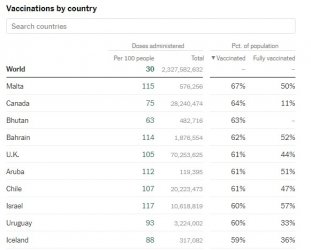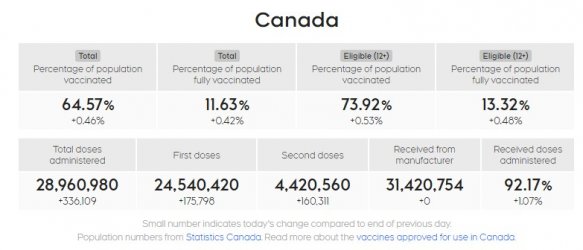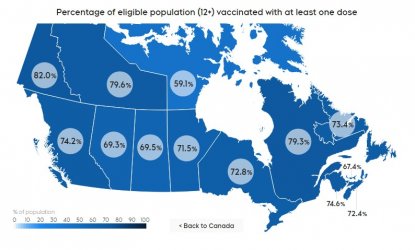I thought I'd offer some perspectives from British Columbia, Canada. I emigrated from Melbourne to Vancouver in May 2019, shortly after I retired. Canada is an interesting comparator for Australia. It is foundationally similar to Australia, is a federal Westminster representative democratic common law constitutional monarchy sharing the same Monarch with Australia, socio-economically on par with Australia and has a fairly robust public health system, quite similar to Australia's.
Covid-19 is endemic in Canada, but the experiences of each province are not universal. Starting from the east, the Atlantic provinces (Nova Scotia, New Brunswick, Newfoundland and Labrador, and Prince Edward Island) established a "bubble" in mid-2020, which required 14 day quarantine for those Canadians outside the bubble. This achieved de facto community elimination, but like any bubble, it was to burst eventually (as I think will inevitably be the case in Australia), and did so when the so-called "third wave" took off in Canada from October 2020 onwards. The bubble has not been re-established as the provinces nationally have established re-start plans following the astounding success of the Canadian vaccination programme (more on this below).
Ontario and Quebec, the two most populous provinces, have been hard hit by Covid-19 for most of the pandemic. The third wave was particularly brutal for these provinces, and the lockdowns in those provinces have been long and hard (for example, from time to time Ontario closed all but essential businesses, and Quebec had curfews in place).
The prairie provinces of Manitoba, Saskatchewan and Alberta had the next unhappiest pandemic, particularly in the third wave.
British Columbia's pandemic was not too bad, so far as these things go. While the third wave resulted in the highest case numbers, the timing of the third wave coincided with the vaccine rollout, so hospitalisations and deaths started to fall rapidly. The province tried hard to minimise business disruptions, although restaurants and bars were closed to in-person dining and drinking from the beginning of March to 25 May. With the exception of being able to do anything "fun" (eg, travel and the performing arts), things carried on fairly normally in BC.
Things really started to change from February, when Canada's vaccination programme got started in earnest (vaccination for aged care was available from December, but basically confined to that cohort until vaccine deliveries ramped up from February). Although plagued by spotty deliveries (from Pfizer, Moderna and Astra Zeneca) in February and March, once supply stabilised, the vaccination programme has been a resounding success. This is from Friday's NYT, showing where Canada sits on the global league table:
View attachment 250356
And this is the lay of the land in Canada right now:
View attachment 250357
View attachment 250358
The majority of those almost 29M doses have been since February. The seven day rolling dose average is sitting at 400,000 doses nationally per day. Vaccination (delivered through mass clinics and pharmacies) operates every day of the week, and clinics (staffed by anyone qualified to give an intramuscular injection - doctors, nurses, pharmacists, paramedics, medical students) operate long hours to ensure convenient access for people. Second doses are ramping up right now. In British Columbia, the province has implemented various granular strategies to reach people who may have limited access (for whatever reasons) to vaccination. The BC provincial government and health authority seems confident the vaccination rate will reach 80% of the eligible 12+ population. Quebec is almost there!
Pfizer has been the workhorse of the Canadian vaccination programme. Moderna has been very unreliable in its delivery volumes, although the next four weeks may see Moderna catch up (it is millions of doses behind). AZ got off to a promising start, but was undermined by the approach taken to the TTS situation (quite poorly handled, IMO), and basically stopped being made available to under 40-45s (the age varied from province to province). As it is safe, efficacious and effective, and was the first vaccine available to me and offered to me, I gladly and gratefully received AZ, and will have my second dose of it in the week of 20 June. Although I could have chosen to have a mRNA vaccine for my second dose, I elected against this as I think the science scales tip in favour of completing a first homologous vaccination regime, and then going down the heterologous path when it comes time for my booster (next year, I am guessing).
The success of the vaccination rollout in Canada is attributable to several matters:
1. Government (at all levels) and public health authority messaging about vaccines and vaccination has been clear and consistent at all times (in very distinct contrast to the Australian approach) - each vaccine approved for use in Canada is safe, efficacious and effective, the best vaccine is the first vaccine you are offered, and the pandemic won't end unless you are vaccinated.
2. Against the background of consistent messaging and the steady success of vaccination in the UK, USA and Israel, vaccination hesitancy rates declined very significantly from December 2020 until March 2021 (when the last surveys appeared to have been conducted), when they reached 25-30%, and the real world experience since then suggests that hesitancy rates have fallen even further.
3. An almost complete absence of any politics playing by all levels of government. There's been a little bit of politicking about the US-Canada border re-opening, with the Premier of Ontario trying to do some "look over there" attention diversion from his province's own pandemic misfortunes, but I think that virtually everyone has seen through that, and looks forward to the border re-opening once a sufficient number of Canadians are fully vaccinated (the Federal government has not said what that number is, but I suspect it will likely be around 70-75%).
4. More recently, the publication by most of the provinces of their re-start plans, most of which expressly tie vaccination rates to re-opening activities. People want to be able to get back to travel, the performing arts, seeing friends and families, not wearing masks and watching hockey as a spectator. In British Columbia, we're going to step 2 of our plan tomorrow, but a big date in our plan is 1 July, which is when the indoor mask mandate will end (and shift to "recommended"), things like no restrictions on indoor personal gatherings, some return of the performing arts, no group limits on indoor dining and drinking, nightclubs etc re-opening, indoor fitness classes resuming and some indoor sports spectating. An even bigger date is 7 September - the "back to normal" date, which is dependent on more than 70% of the 18+ population have had their first dose, and case counts, hospitalisations and deaths remaining "low". The province has been a bit fuzzy about what "low" means, but I suspect it means below where we currently are - 71 in hospital, and a rolling seven day average of 160 new cases (the majority of BC's cases come from one health region, which has some particular demographic characteristics (comparatively dense multigenerational housing and the majority of non-remote close quarters workplaces).

www.sydney.edu.au

www.sydney.edu.au

























